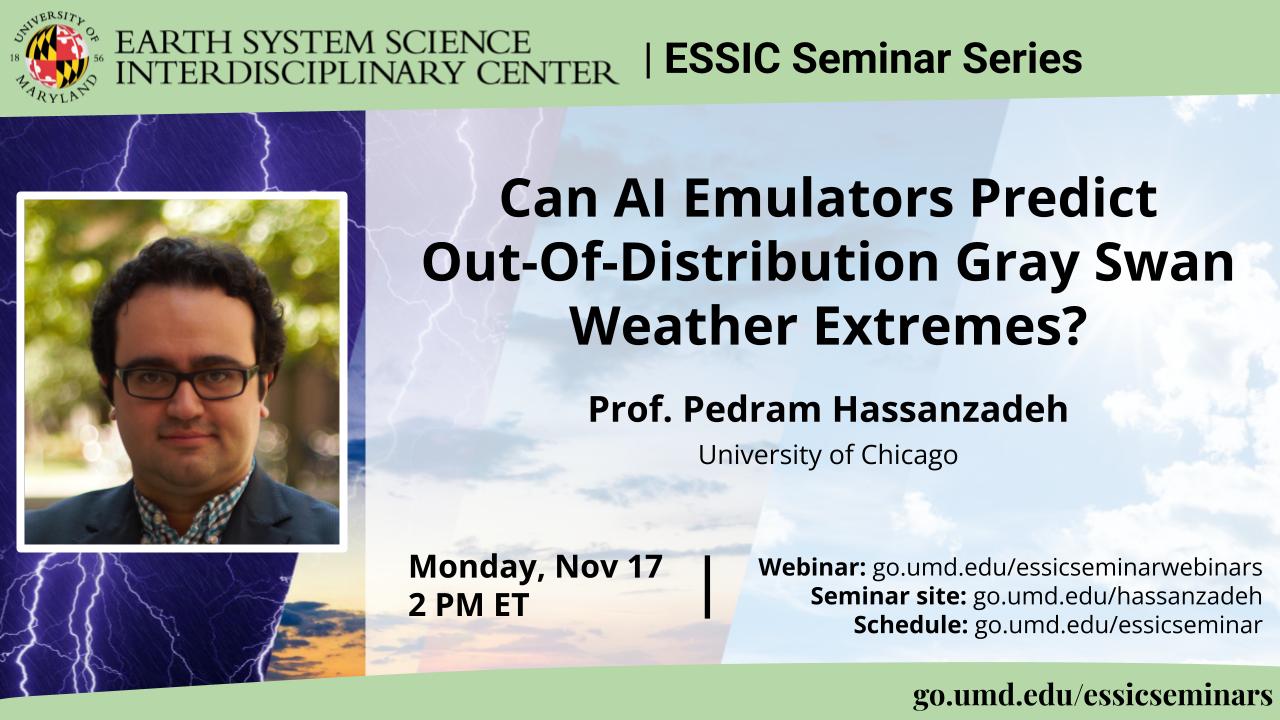
Can AI Emulators Predict Out-Of-Distribution Gray Swan Weather Extremes?
Prof. Pedram Hassanzadeh
University of Chicago
Monday November 17, 2025, 2 PM ET
Abstract:
Artificial intelligence (AI) is transforming weather and climate modeling. For example, neural network–based weather models can now outperform physics-based models for up to 15-day forecasts at a fraction of the computing time. In this talk, I will present examples of both successes and limitations of current AI models and discuss ways to make progress through integrating tools and insights from AI theory, weather and climate dynamics, and applied mathematics.
As one example of success, I will present our recent work on AI-based forecasting of the 2025 Indian monsoon onset and the dissemination of this information to 39 million farmers 30 days in advance. As examples of current limitations, I will highlight challenges in learning the rarest yet most impactful weather extremes, particularly the “gray swans” (i.e., physically possible events so rare they have never appeared in the training set). I will also discuss difficulties in capturing broad temporal scales, for example, predicting the quasi-biennial oscillation (QBO). In addition to outlining potential solutions to these challenges (e.g., AI-boosted rare-event sampling), I will show some of the surprising capabilities of these models, such as transferring what they learn from one region to another for dynamically similar events, which can be further exploited in future model developments.
Relevant materials:
Papers on gray swans and extremes
https://www.pnas.org/doi/abs/10.1073/pnas.2420914122
https://arxiv.org/abs/2505.10241
https://arxiv.org/abs/2510.27066
Biosketch:
Pedram. Hassanzadeh is an Associate Professor at the University of Chicago’s Department of Geophysical Sciences, Committee on Computational and Applied Math, and Data Science Institute. His research is at the intersection of climate dynamics, scientific machine learning, and computational and applied math. He is the faculty director of the AI for Climate Initiative (AICE) and co-director of the Human-centered Weather Forecasting Initiative. Hassanzadeh received his MA and PhD from UC Berkeley and was a Ziff Environmental Fellow at Harvard University before joining Rice University in 2016 and the University of Chicago in 2024.
Webinar:
Event site: https://go.umd.edu/hassanzadeh
Zoom Webinar: https://go.umd.edu/essicseminarwebinars
Zoom Meeting ID: 918 7733 3086
Zoom password: essic
US Toll: +13017158592
Global call-in numbers: https://umd.zoom.us/u/aMElEpvNu
For IT assistance:
Cazzy Medley: cazzy@umd.edu
Resources:
Seminar schedule & archive: https://go.umd.edu/essicseminar
Seminar Google calendar: https://go.umd.edu/essicseminarcalendar
Seminar recordings on Youtube: https://www.youtube.com/user/ESSICUMD

